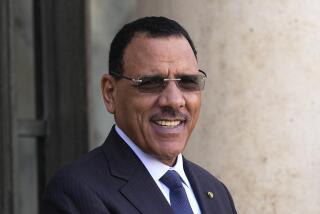Suriname Quiet After Coup; Military Vows to Hold Election Soon : South America: Leader of takeover says people can now ‘choose a better government.’
- Share via
PARAMARIBO, Suriname — The Suriname army chief who led a bloodless Christmas Eve coup pledged Tuesday to relinquish power to an elected government within 100 days and denied that an ousted dictator was involved.
“The army is not bent on having and keeping power,” Cmdr. Ivan Graanoogst said on state-run radio, a day after he and other officers overthrew the elected 3-year-old government of President Ramsewak Shankar.
The military removed Shankar and his Cabinet as they met at the presidential palace Monday evening and as many Surinamese were attending Christmas Mass.
The coup will “give the Surinamese society a chance to choose a better government that can give content to a credible democratic structure,” Graanoogst said in an interview with Dutch television.
Graanoogst said Paramaribo’s international airport and two smaller airports remained open and there would be no curfew because “there is no danger whatsoever.”
No one was injured or arrested in the coup and the army is allowing the ousted president and his ministers complete freedom of movement, Shankar said in an interview from his home.
“I’m free to go wherever I want to,” he said.
The coup was seen as the culmination of a conflict between Shankar and Desi Bouterse, dictator of Suriname from 1980 until 1988. Shankar took office that year after defeating a candidate backed by Bouterse. Bouterse stayed on as army chief.
The Netherlands, the former colonial ruler of the nation of 400,000 people, said it was cutting aid to the Suriname government. Its Foreign Ministry said it “sharply condemns the undemocratic seizure of power by the Surinamese Army.”
In Washington, State Department spokeswoman Sondra McCarty said: “We condemn this violation of constitutional order in Suriname . . . We call on the Surinamese military to restore power immediately to the democratically elected authorities of that country.”
It did not appear that U.S. citizens in Suriname were in danger, McCarty added.
Normal holiday activity resumed Tuesday in Paramaribo. People flocked to churches for Christmas services and there was no unusual military presence on the streets.
International telephone service was restored Tuesday afternoon. It had been cut Monday night shortly after the coup.
“Everything is completely normal, as if nothing has happened,” said a Surinamese journalist, who asked not to be identified. “Life in the country goes on.”
Bouterse was believed to be the mastermind of the coup. But Graanoogst claimed that “the former commander in chief, Desi Bouterse, was not at all involved. Bouterse is at home and, like a real Surinamese, he offers his input when necessary.”
Graanoogst promised to set up an interim Cabinet that would organize free national elections within 100 days. He refused to speculate who would be appointed as the country’s leader in the meantime.
The coup occurred at 11 p.m. Monday, as Shankar and his Cabinet held an emergency meeting to discuss Bouterse’s announcement earlier in the day that he was resigning because of differences with Shankar. Graanoogst, head of the nation’s military police and one of four military commanders, acted as nominal head of the new military regime when Bouterse quit.
A high-ranking government source said the military told Shankar it was assuming control and asked the president and his Cabinet to leave the presidential palace. They decided to do so to avoid bloodshed, the source said.
Later Monday night, Graanoogst appeared in uniform on state television to announce the coup.
BACKGROUND
Suriname, a 63,037-square-mile country on the north coast of South America, was acquired by the Netherlands from Britain in 1667 in exchange for Manhattan Island. The population of 410,000 is racially diverse, composed of Creoles, East Indians, Indonesians, Indians, blacks and Europeans. After gaining independence from the Netherlands on Nov. 25, 1975, Suriname adopted a parliamentary form of democracy. But a coup on Feb. 25, 1980, put army strongman Desi Bouterse in power. He ruled until elections were held in 1987 and Ramsewak Shankar became president. Before the 1980 coup, Suriname was one of the most prosperous countries in South America.
More to Read
Sign up for Essential California
The most important California stories and recommendations in your inbox every morning.
You may occasionally receive promotional content from the Los Angeles Times.













